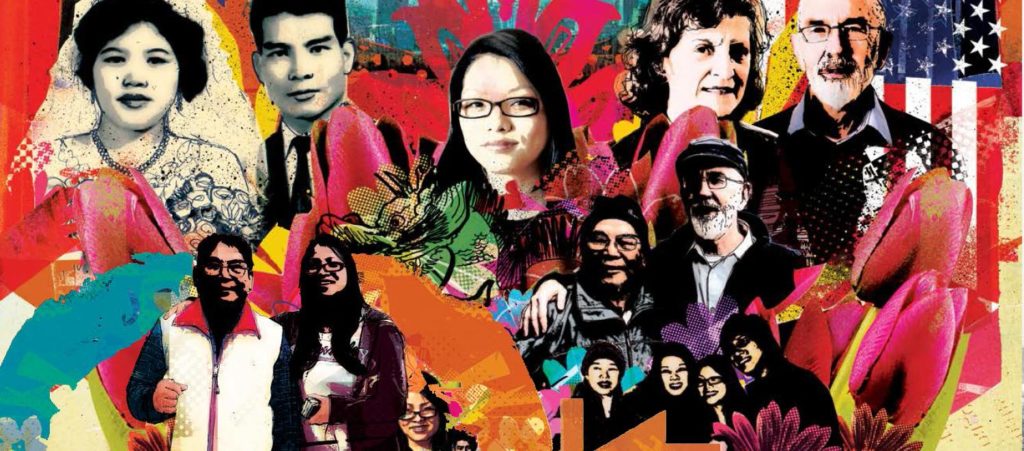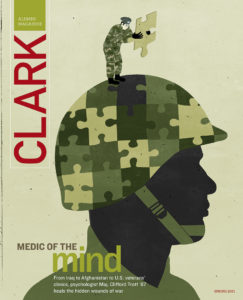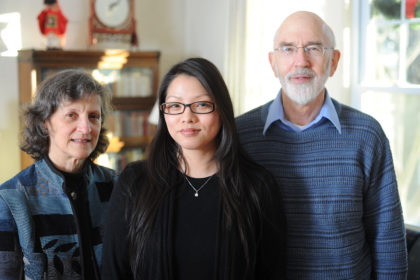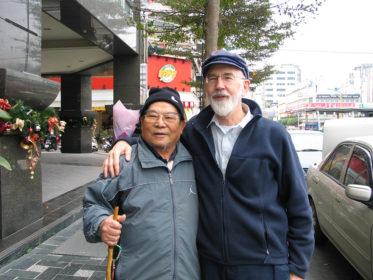Finding Mr. Wu

The story begins with a man and a baby, his daughter. There are tears.

In a Taiwan hospital, Zhen-yi Wu weeps not for his infant girl, who was born prematurely, yet who is healthy and beautiful. He cries for his wife, who had experienced complications during childbirth, requiring blood transfusions and other dramatic measures. Five days after delivering, her body weak and depleted, she has died, and now he regards the baby in a sobering light.
Zhen-yi already has a boy and two girls at home, and he works a low-paying custodial job. How can he provide for four young children as a single father? What kind of life can he give this child?
Faced with a terrible choice, Zhen-yi Wu mulls the possibility of giving up his daughter for adoption. The hospital staff knows of an American couple who has inquired about adopting a baby girl. Perhaps this is the family his baby should go to.
Zhen-yi reluctantly decides he must travel this path for his daughter’s sake. Later, he will sign the adoption papers, but he will also leave something behind: a forwarding address. Maybe one day, he reasons, his girl will try to find him. And he wants to be found.
♦♦♦♦
Professor Paul Ropp has been teaching Asian studies at Clark since 1985, and before that taught for 10 years in Memphis. His career is a singular passion, one that has sent him overseas many times, including to China where he’s had a ringside seat to the emergence of a new superpower.

In 1972 Paul was a student working on his dissertation in Japan. By then, he and his wife Marjorie had two sons and were considering having a third child. With population control a worldwide concern (the book “The Population Bomb” had sounded a clear warning), the couple began talking about adopting. They had friends who ran an orphanage in Taiwan, and they wrote the Christian Children’s Fund to let them know they’d be interested in adopting a baby girl.
The agency offered little hope, explaining that it typically helps families support their children at home rather than organize adoptions to outside parties. Six months later, the Ropps arrived in Taiwan where Paul was continuing work on his dissertation. To their surprise a letter from the Christian Children’s Fund was waiting for them.
“It said, ‘We have a baby girl for you,’” Paul recalls.
The girl they would name Amy was just four months old and living in an orphanage in Taichung, two hours south of the capital city of Taipei. Paul and Marj visited her and fell in love, but they couldn’t take her from the orphanage until all the bureaucratic hurdles had been cleared. So they were forced to leave Amy behind while they returned to Taipei. “That was hard,” Paul acknowledges.
Two weeks later they got a call on a Sunday evening informing them to appear at the courthouse at 9 a.m. the following day. There, they met Amy’s father, Zhen-yi Wu, and signed the papers. The procedure was brief.
“It was a very simple process compared to today,” Paul says. “Getting her American visa was more complicated. We had to be fingerprinted, have background checks done at the U.S. Embassy. It was very rigorous.”
Eight months later, the paperwork finally in order, the Ropps brought Amy home with them to the United States. Through the years they made sure she knew the story behind her adoption, even though Amy exhibited little interest in her background. “Amy was totally American and intent on fitting in,” says Marj.
The Ropps returned to Taiwan in 1984 when Amy was in seventh grade so Paul could take a language-refresher course. The family was preparing to move from Memphis to Worcester, where he was joining the faculty at Clark University.
“We’d be walking on the street in Taiwan and people would start speaking to Amy, assuming she was our escort,” Paul says. “That made her want to study Chinese, but only while we were in Taiwan. She didn’t continue with it back in the States.”
During that same summer, the Ropps made a trip to Hualien, the seaside city where Amy was born. Amy was unimpressed with the city, which was less developed than other more sophisticated Chinese cities she’d visited. Marj recalls, “Amy said, ‘I wonder what it would have been like growing up here? I don’t think I would have liked it.’ All she knew was American culture. She didn’t have much more curiosity about her heritage for many years.”
♦♦♦♦
Life moved on for Amy — school, work, and a family of her own. In 1994 she gave birth to a son, Christopher Jonathan, known by all as CJ. His arrival got her thinking a little more about her birth family in Taiwan.
“She was particularly curious about her mother, what she looked like, whether they had any resemblance,” Marj says. “She had no identification with her parents or siblings. On the contrary, they very much had an identification with her because she was their long-lost sister.”
Three years ago, Paul and Marj asked Amy if she would be interested in trying to find her Taiwanese family. She thought it over and responded, “Yes.” They knew it would be a difficult task since there had been no contact in nearly forty years.

“We had an address Mr. Wu had left in 1972, but we assumed it was useless because so much had changed in Taiwan,” Paul says. “In 1984 when we went back to look for the house where we’d lived in 1972, it was long gone. So we believed there would be no easy way to find her family.” There were other considerations.
“Sometimes these things don’t work out so well,” Marj says. “We had to find out about the family. Were they still around? Were they in good health? Were they interested at all [in a reunion]? It was important that we make some contacts first.”
Fortunately, the Ropps had allies in their quest: missionary friends Ted and Beverly Skiles who ran an orphanage an hour’s drive from where Amy was born, and who were comfortable working within the Taiwan bureaucracy. The friends said two graduates from their orphanage were now working as police officers in Hualien and could be enlisted to help search for Amy’s father.
In June 2009, Paul and Marj traveled to Asia to meet with Clark alumni in several cities, including Taipei. A week into their trip they received an e-mail from the Skiles saying that in order to receive any government assistance to locate Mr. Wu, the Ropps would need to produce a notarized statement from Amy in English and Chinese indicating her wishes to find her father. Since that wasn’t possible while they were traveling, the Ropps assumed the search was temporarily suspended.
A week later, the Ropps received a second e-mail from their friends: they’d located Amy’s father.
Zhen-yi Wu no longer lived at the address he’d left at the courthouse in 1972. In the intervening years his house had been devastated by a typhoon and rendered unlivable. But he’d intentionally remained registered at that address in the slim hope that his daughter could still trace him if she chose to.
“That gave us chills,” Paul says.
A few days after learning the news about Mr. Wu, the Ropps were in Taipei for a Clark alumni reception. They connected with Ted Skiles, who invited them to spend a day with him at the orphanage.
“Ted picked us up, and as he was driving he said, ‘Look, shall I call the social worker and have him contact Amy’s father?'” Paul recalls.
Says Marj, “This was the moment. And it was like … wait, am I ready for this?”
They spent the night at the orphanage and the next day they were on a train to Hualien, carrying two photos of Amy they’d printed from Paul’s laptop and had framed in a local shop. There, they met Mr. Wu and his oldest daughter, Hui-zhen, and one of his granddaughters.
“They brought us a bouquet of flowers; they were so gracious,” Paul says.
The Ropps learned that Hui-zhen lives in Hualien with her family and is in the construction business; Amy’s other sister, Hui-ru, lives in Shanghai where her husband works in real estate, and her brother, Yun-hua, is a marble engraver in Taipei.
Mr. Wu had retired many years earlier at age 60 and now lived in a comfortable apartment owned by Hui-ru. One wall was filled with family photographs.
“For the first time we saw pictures of Amy’s family,” Marj says. The wall was like a visual timeline of the Wus, depicting not only Amy’s brothers and sisters, but nieces and nephews, cousins, aunts and uncles and in-laws she never knew she had. The picture of Hui-ru, the Shanghai sister, was especially remarkable because it looked exactly like Amy in her high school graduation photo. Paul conversed in Chinese with Mr. Wu, filling him in on Amy’s history, and learning about the progression of the Wu family over four decades. “He said, ‘This is a miracle that you found us,'” says Marj. “He was overjoyed.” Adds Paul, “He said, ‘I don’t care about any material things. I just want to see my daughter.’”
He would. On Christmas Day 2009, the Ropps flew out of Boston with Amy and her son CJ. In Los Angeles, they all boarded a midnight flight to Taipei along with the Ropp sons Ben and Andy, and Andy’s wife and two children. They landed in Taipei, where they were met by Clarkies Yen-hung Lo, M.A. ’92, Ph.D. ’96, and Ku-jun Lin, MBA ’94 and his wife Wen-chen, who had made reservations at area hotels and helped facilitate their stay. The Ropps spent two days with Amy’s brother, Yun-hua, before taking a train to Hualien, where Amy’s father and sisters were waiting.
“I didn’t grow up feeling there was a huge emptiness in my life,” Amy says. “I’ve always known that my father gave me up for adoption not because he didn’t want me, but because he couldn’t care for a little baby at that time. I was happy to finally meet him, but a little nervous. I wondered how he would react; if he was expecting something more than I am.”
Father and daughter put their arms around each other; Amy’s sisters embraced her, and something was spoken in Chinese that Amy couldn’t understand. Later, she learned it was: “We’ve been waiting forty years for this day.”
♦♦♦♦
The language difference was a challenge, though not insurmountable. Paul acted as interpreter; one of Amy’s brothers-in-law spoke serviceable English. Andy Ropp, who had spent two and a half years in Japan, was able to converse in Japanese with Mr. Wu — affectionately known as BaBa by his children — who had been raised under Japanese occupation and knew the language.
“When Andy started talking to him in Japanese it was like a light bulb went on with Mr. Wu,” Paul remembers. “Everyone was transfixed on this moment.”
“Because of the language difference, we never got too much below the surface, which was probably just fine for this first meeting,” says Marj. “The wonderful thing about this event was that there were two families coming together for the first time, who were intimately connected but who had no history of past experiences, so there was no baggage. This was a moment of love, purity, and joy.”
Over the course of several days, the Ropps were treated to meals in fine restaurants — the food was so memorable they photographed it for their album — and were ferried to Taiwan landmarks in a 10-passenger van the Wus had rented for the occasion. Their Taiwanese family wouldn’t let their American guests pick up a tab for any purchase, large or small.
The decades melted away over the next several days as the families filled in the historical gaps. The Ropps presented the Wus with photo albums of Amy’s life, from infancy to the present, and loaded their camera with pictures of the reunion.
Amy learned that about 20 years ago her sisters had tried searching for her but were unsuccessful. They never told their father because they didn’t want to disappoint him.
“The daughters are very solicitous of their father and take good care of him,” says Marj. “He’s not in good health, and they were thrilled he was able to complete this major part of his life.
“I think Amy was a little overwhelmed by it. Their identification with her already was so full of emotion; they had memories of her and of their mother. That wasn’t true for Amy.”
“It was clear to me he is an incredibly compassionate man,” Paul says of Mr. Wu. “His daughter told us he never remarried because he always feared a new wife would never accept his children.
“What struck us in a way we hadn’t been conscious of before was the tragedy they experienced, and how their tragedy, in a sense, became our blessing. Yet they were so generous and gracious in embracing us, and so grateful for us finding them.”
Mr. Wu had earlier said that all his photos of Amy’s mother had been destroyed in a typhoon. But the day before the Ropps departed from Taipei, Amy’s brother gave her a black-and-white wedding photo of Zhen-yi Wu and Fan Jin-zi, Amy’s mother. This stunning image of a handsome young man and a beautiful young woman with a face remarkably like Amy’s now graces the table in Amy’s home.
♦♦♦♦
The story ends with a man and a woman, his daughter.
There are tears.
In Hualien station, Mr. Wu stands on the train platform ramrod straight, his hands wrapped around his walking stick, which he holds in front of him at chest level. He looks at Amy on the other side of the glass and he weeps — with joy that his girl has found him, sadness that she must now depart to continue her life, relief that she is well and that the decision he made nearly forty years ago was the right one.
Over the next year, the Ropps and the Wus will exchange e-mails, with Paul doing the translating for Marj and Amy, and signing off as “Your American Uncle.” The Wus will send a tape at New Year’s offering their best wishes and urging Amy, a nursing student, to work hard, using an old Chinese expression that translated literally means “add oil.” Amy wants to study Chinese and is planning a return trip to Taiwan this May.
On Thanksgiving 2010, Hui-ru will write her American sister, making a brave effort to understand the workings of the holiday (“It is a day for the family to gather for dinner with turkey, salad, bread, and red wine! Is that right?”).
And a final message: “BaBa wants us to tell you when we write that he loves you and misses you every day. Although you are all very busy, please remember that your Taiwan family misses you and hopes you are happy.”
From the platform in Hualien, Amy’s sisters approach the train and press their hands to the glass. Amy presses back. The train starts to move. The families wave as the train pulls away, and until they can no longer see one another. “Dad,” Amy says. “That was hard.”
Marj later will write about Amy’s reunion in a family newsletter, concluding her account with a Chinese phrase that the Ropps and the Wus believe will hold true.
Zai jian, zai jian. See you again. See you again.
This story was originally published in CLARK Magazine, spring 2011.


